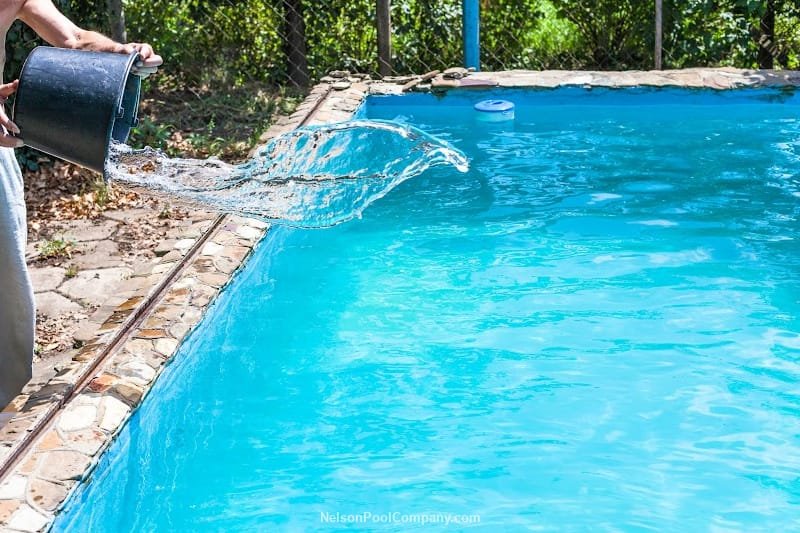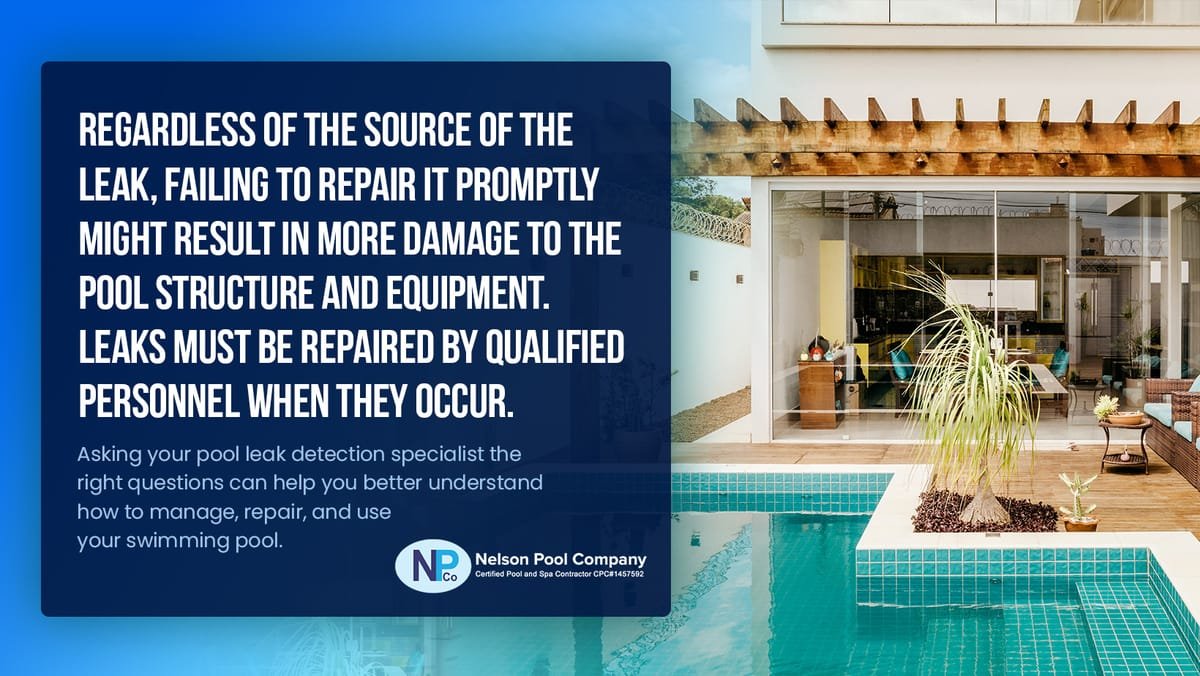Leaks in your pool can happen anywhere. However, before you look for a leak, you must rule out a few things, such as evaporation or a breach in the filter system plumbing. Begin by inspecting the complete filter system. This includes your pool pump, filter, heater, chlorinator, as well as any O-rings or connectors that may be leaking water.
Fortunately, these leaks are simple to find. There’s a potential, though, that there’s a leak in a section of your plumbing that you can’t see. For instance, leaks can occur due to broken underground piping if you have an inground pool. So, it’s a good idea to inspect your pool regularly even if you’re not sure if you have a plumbing leak or not.

There are many ways to know if your pool line is leaking. One common means to do so is doing a bucket test. This test is useful because it helps you determine whether evaporation or a leak is causing your pool’s water level to drop.
Knowing the signs of pool leaks will also help you figure out why and from where your pool is leaking. Check out the following ways to know if your pool has a leak.
Please include attribution to https://sarasotapoolleakdetection.com with this graphic.
1. Look Around the Pool for Signs of a Leak
Pool water evaporation is typical, but if it appears that more than a half-inch of water is being drained each day, there is most certainly a leak somewhere. Swampy areas on the lawn or on the pool deck, as well as visible damaged tiles or concrete, are further symptoms of a pool leak.
Chemical concentrations will alter a lot when you’re continually bringing additional water to the pool, making it difficult to maintain proper chemical levels. If you’ve been filling your pool more frequently, you may have noticed an increase in your water bill.
2. Inspect the Equipment Pad for Leaks
Another place to look for leaks is the equipment pad. Water may leak into the equipment pad if a connecting seal has broken or a part has failed. You’ll need to inspect the area for a few days because water may not be evident right away.
The culprits could be valves, pumps, filters, or heaters. When inspecting this area, be particularly cautious to prevent being shocked by an exposed electrical line that may be moist.
3. Use the Bucket Test
A bucket test is an excellent approach to determine whether the pool water is evaporating or leaking. Fill a 5-gallon bucket halfway with pool water and use painter’s tape or duct tape to measure the top of the waterline. Mark the pool water at the top of the waterline with another piece of tape.

Allow a day or two for the bucket to sit next to your pool, then check the difference in water levels between the two tape lines. A pool leak, not evaporation, is the most likely cause of a substantial variation in water levels.
4. Do a Dye Test to Pinpoint the Leak’s Location
You can use food coloring or a special pool leak detecting dye to find the leak once you’ve ruled out evaporation and confirmed you have a leaky pool. Wearing goggles will assist you see what’s going on if you want to swim to the bottom of your pool.
Moreover, squirt a little amount of food coloring or dye in the water around any incorporated parts or plumbing fixtures. If a skimmer, pump, or drain has a leak, the dye will come naturally toward it and be pulled out.
When the water isn’t churning, it’s easier to see the dye being drawn toward a leak, so, wearing a snorkel to breathe while viewing under the water is another option.

5. Hire a Professional Pool Technician
You’ll need to call a local pool care firm if you can’t figure out where the leak in your pool is (or if you’ve identified one but don’t know how to fix it). Pool professionals are also the most qualified to repair a leak in most pools.
If your vinyl pool liner or Intex pool liner is older and has a leak, pool liner repair may not be possible, and replacement may be the best alternative. Pool professionals will also carefully fix a leak in the equipment pad that could cause electrical shocks. Leave the hard work and knowledge to a contractor who knows how to identify the faulty pipe and repair it if the pool is leaking in the subsurface pipes.
Take Away
While most pool water loss is due to evaporation or excessive splashing, the pool may have acquired a leak. A leak can be identified and located using the tried-and-true bucket method or a food coloring test. If you don’t want to spend time underwater looking for a leak or if your efforts have failed, you may always contact a professional.
This is to help you detect a leak inside the pool. Besides, water safety should always be practiced around pools, and a professional can ensure that a leak is located and repaired in the safest, most effective way possible. If you notice any leaks, please call us immediately! We’re pleased to assist you in locating and repairing the leak so that you can go back to enjoying your pool.

Our experts can help you detect leaks in your pool and make the necessary repairs. We also offer preventative maintenance plans to help you avoid future problems with your swimming pool.
Call (561) 570-1269 now and we will schedule a pool repair and renovation company in your area to reach out to you. They will schedule a time convenient for you to stop by and give you a bid on the repairs.
Or you can fill out this form and we will have the best pool renovation company in your area contact you!
**In case you can not view this video here, please click the link below to view How Do I Know if My Pool Line Is Leaking? on my YouTube channel: https://www.youtube.com/watch?v=eGS_J20FEqY **
